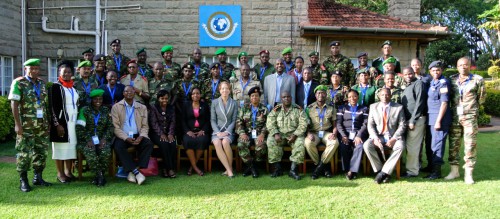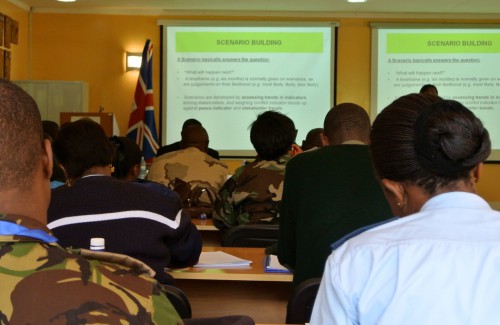8th January 2015 London, UK
Training peacekeepers to prevent sexual violence, with the British Peace Support Team (Eastern Africa)
 Caroline Vaudrey writes about UK-supported training for peacekeepers in Somalia.
Caroline Vaudrey writes about UK-supported training for peacekeepers in Somalia.
Preventing sexual violence in conflict – what does that mean exactly and how do you train peacekeepers to do this? I needed to find out. So, I visited a course in Kenya training Africa Union (AU) peacekeepers who would be deployed to AMISOM, the AU mission in Somalia.
But first, why is it important to train peacekeepers on this and what difference does it make? Well, both UN and AU peacekeepers operate under a mandate which sets out the specific tasks they need to do, which nearly always includes Protection of Civilians. Which means it is part of a peacekeeper’s job to protect civilians.
But ‘what’s that’ I hear you ask. Part of this Protection of Civilians mandate is to take action to prevent and respond to sexual and gender based violence (SGBV) in local communities. As you’ll know many people still experience horrifying sexual violence in fragile states. For example, the UN Secretary General’s August 2014 report on the Central African Republic estimated that 44.5% of people, that’s nearly half of the whole population including children, had been subjected to sexual violence that year alone. It is a huge, huge problem. But risk of attack is dramatically reduced when peacekeepers patrol at night, create safe areas through their presence, or escort civilians to school, market or to collect water and firewood. I saw for myself the lasting legacy of sexual violence when I was posted to Rwanda 10 years after the genocide; widows and orphans living with HIV among many others. Rwanda has transformed itself and is currently the fifth largest troop contributor to UN peacekeeping missions with a particularly strong commitment to protection of civilians.
The two week course in Kenya was run by the International Peace Support Training Centre overseen by the MoD’s British Peace Support Team (BPST) under the guidance of their Commander Colonel Richard Leakey and funded by the Conflict Pool through the BPST. There were 42 senior participants from 11 countries across Eastern Africa; 11 were already deployed to AMISOM, there were 13 women including an AMISOM Gender Adviser. While I was there a course participant was appointed as her contingent’s Gender Adviser to AMISOM; and it was clear to me that the right people were on the course. So it’s important to train the right people, but how can that make a difference to such a big problem?
Well, I spoke to one participant who told me that what he’d learned on the course about the international legal framework which would give him the knowledge and ability to challenge the status quo and the ‘we’ve always done things this way’ viewpoint where he worked on planning. He was eager to make a difference. Another told me that the training materials provided would allow him, as head of training for his military company, to introduce a new course training all his colleagues. The Gender Adviser already working in Somalia told me she now had a far better understanding about her role and had a clear vision of what she wanted to achieve.
The trainer was a dynamic Kenyan civilian with academic expertise as well as a range of field experience. She challenged participants saying ‘leaders should be readers’ and urged them to familiarise themselves with the UN Security Council Resolutions on Somalia and the UN Secretary General’s reports. She described her some of her experiences from across the continent preventing and responding to SGBV while working with international organisations and NGOs, such as in temporary camps, as well as examples of situations nearer to home of cultural attitudes from her own community and how she addresses these. The whole room was gripped. But she also had everyone in stitches too, a very skilled trainer.
 Imagine that each person here, and each person attending every other course run here (and in other training centres), is similarly motivated to return to their normal job not just with renewed energy and vision but also knowing what they can do in their role to make a difference to civilians. Actually there’s no need to imagine because that is what is happening and it is so inspiring to see. The evidence is on the walls of every room; hundreds and hundreds of class photos listing the course and date. Mediation, protection of civilians, rule of law, human rights. And over at BPST demining, children and armed conflict, and anti IED training. I was so humbled being in a room with people who really do make life or death decisions, all the time. And these decisions not only affect the lives of those they are protecting, but their own too. We are all too aware that many of their colleagues and friends were not fortunate enough to return home to their families after their deployment, especially with another fatal incident against AMISOM troops while I was there. One participant, the class president, was an air force engineer and she co-ordinated the rescue from an adjacent classroom.
Imagine that each person here, and each person attending every other course run here (and in other training centres), is similarly motivated to return to their normal job not just with renewed energy and vision but also knowing what they can do in their role to make a difference to civilians. Actually there’s no need to imagine because that is what is happening and it is so inspiring to see. The evidence is on the walls of every room; hundreds and hundreds of class photos listing the course and date. Mediation, protection of civilians, rule of law, human rights. And over at BPST demining, children and armed conflict, and anti IED training. I was so humbled being in a room with people who really do make life or death decisions, all the time. And these decisions not only affect the lives of those they are protecting, but their own too. We are all too aware that many of their colleagues and friends were not fortunate enough to return home to their families after their deployment, especially with another fatal incident against AMISOM troops while I was there. One participant, the class president, was an air force engineer and she co-ordinated the rescue from an adjacent classroom.
The reason that I wanted to find out more about this area is that I work on conflict related sexual violence and peacekeeping. I prepared the peacekeeping expert sessions for the Global Summit to End Sexual Violence in Conflict where the Chairs and Panellists together with the gathered experts made a range of recommendations. We the UK are working with others in the international community to make these recommendations a reality. The Declaration to End Sexual Violence in Conflict has been endorsed by 155 countries and again, it’s so inspiring to think that globally so many people are working to make the end of sexual violence a reality.
Also, Somalia is one of six focus countries for the UK’s National Action Plan on Women, Peace and Security and we published our tri departmental Implementation Plan on 11 December. BPST and MoD’s important contribution to this agenda through training AMISOM personnel on SGBV, and including SGBV in their general pre deployment training is listed here.
Watching the discussions between the trainer and the participants, and from my own conversations with them all – I could see they had a clear understanding of the international framework and had a new set of tools and mechanisms they could use to prevent and respond to sexual violence. They were each determined to personally make a difference when they returned to their usual roles, whether that was on deployment in Somalia, planning their country’s role in the mission or training others. This was a group of amazing people who have the power to make a difference to civilians in Somalia. And it was just amazing to be there with them for part of their journey.
Caroline Vaudrey, Peacekeeping Team, Conflict Dept, Dec 2014.